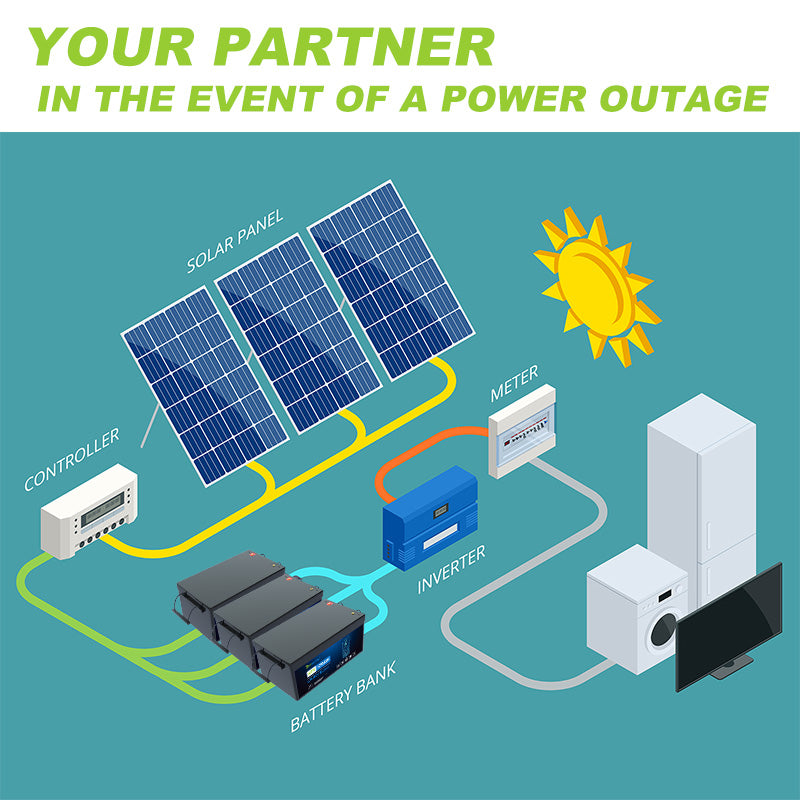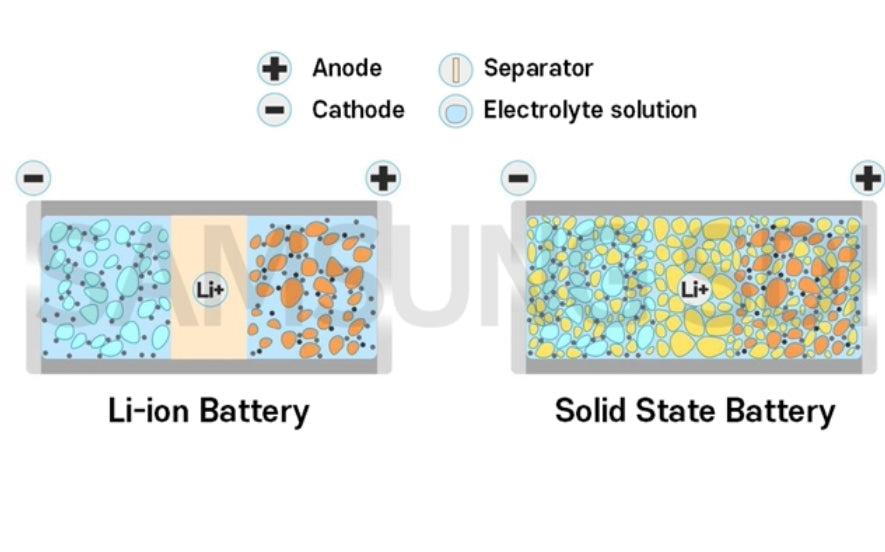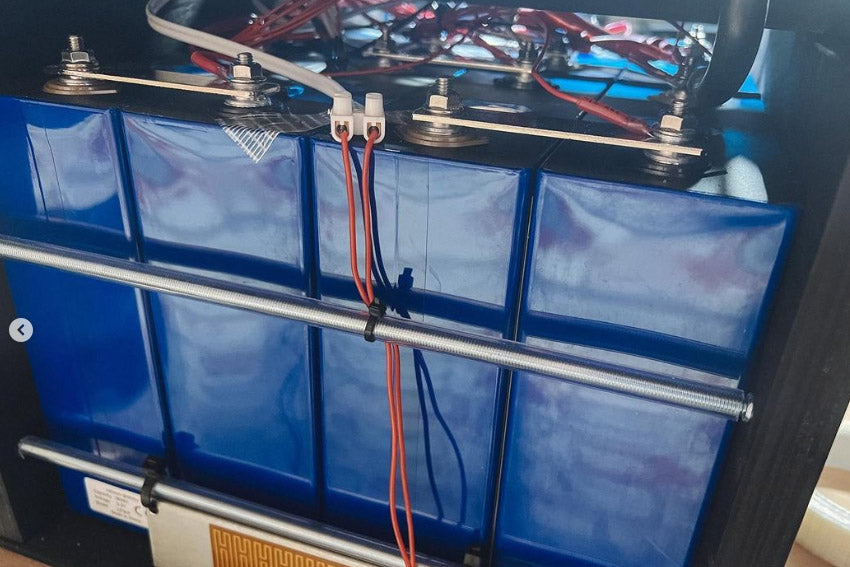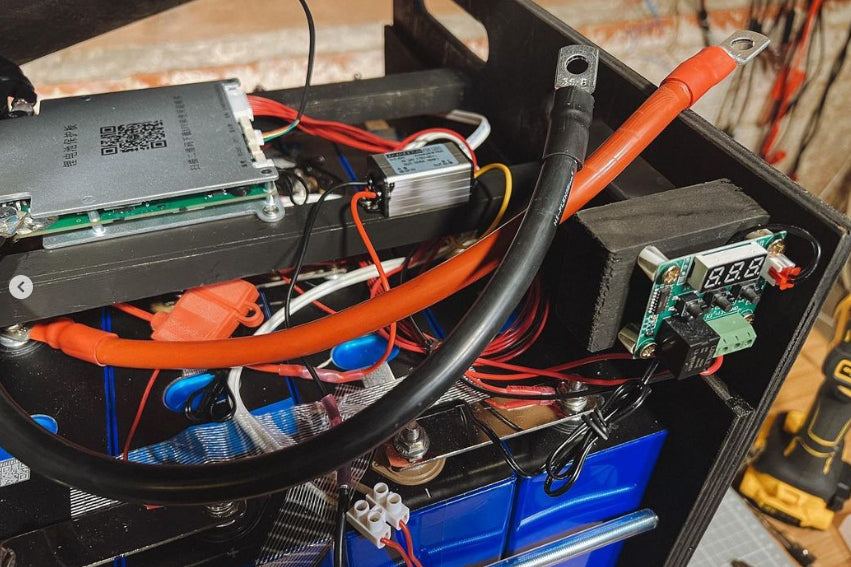Why Choose Diypow Lithium Solar Batteries?
Store reliable energy wherever you need it for life with lithium solar batteries.
Whether you want to power your home, run essential appliances during a power outage, or enjoy off-grid adventures, the Diypow lithium-ion solar battery offer unmatched performance. We've combined powerful lithium batteries, Grade A battery cells and Bluetooth monitoring for longer battery life, providing a longer cycle life, the reliability of a 10-year warranty, and a reduced need for frequent replacement.
With a solar lithium battery, you'll experience higher efficiency, faster charging, and a lightweight design that simplifies installation and portability. Our batteries can withstand harsh environmental conditions, ensuring durable and reliable performance even in extreme temperatures.
We understand the importance of safety, which is why the Diypow lithium solar battery includes comprehensive protection mechanisms to prevent overcharging, overdischarging and short circuits. This ensures the longevity and stability of your solar system while giving you peace of mind.
24V 200AH Diypow Deep Cycle LiFePO4 Battery Pack Low Temperature Protection
24V 300AH Diypow Deep Cycle LiFePO4 Battery Pack Low Temperature Protection
48V 100AH Diypow Deep Cycle LiFePO4 Battery Pack Low Temperature Protection
48V 200AH Diypow Deep Cycle LiFePO4 Battery Pack Low Temperature Protection
48V 300AH Diypow Deep Cycle LiFePO4 Battery Pack Low Temperature Protection
Diypow Best Lithium Solar Batteries
Whether you are a home user or a commercial business, Diypow lithium batteries can be of great benefit to you. For home users, our lithium battery system can efficiently store energy collected from solar energy for your use at night or on cloudy days. This means you can reduce your reliance on the traditional electricity network, lower your energy bills, and have less impact on the environment. In addition, our lithium batteries offer excellent safety and long life, providing you with a reliable energy reserve.
Whether you're camping, in the middle of nowhere, or living in a remote area, our ionic LiFePO4 batteries will keep your lights on when you need them most. When combined with solar panels, LiFePO4 batteries eliminate the need for shore power or generators. You can store your own clean energy and use it in the winter and on cloudy days. Enjoy reliable energy during power outages and in remote areas.
When you choose Diypow lithium batteries, you will receive high-quality products, as well as comprehensive after-sales service and technical support. We are committed to providing our customers with seamless solar solutions for a wide range of applications. Enjoy 100% clean energy with solar lithium batteries.
More Application Scenarios
Lithium Batteries for Solar Power Systems
⚡OFF-GRID SOLAR POWER SYSTEMS
⚡BACKUP POWER FOR GRID-TIED SYSTEMS, OR HYBRID SYSTEMS
Diypow Lithium Solar Batteries
⭐Consistent Output
⭐Long Lasting
⭐1/3 Lighter Than Lead Acid Battery
⭐6 Strong Protections
⭐Fast Charge
⭐Higher Discharge Rate
Best Selling Solar Batteries
Diypow 48V 120AH Drop-In SLA Replacement Deep Cycle LiFePO4 Battery Pack
Lithium Solar Batteries Buying Guide
You've invested time, effort and money into building your solar system. Why not make sure it functions at an optimal level? Yes, lithium batteries may be more expensive on the front end than lead-acid batteries. But their lifetime value far outweighs your initial investment.
Considering longevity, efficiency, rechargeability, safety and durability, the answer is clear. Lithium batteries win out over the competition. Let us help you choose the right LiFePO4 battery for your solar array today!
- What is Lithium solar battery?
- How do lithium solar batteries work with solar panels?
- Is lithium battery good for solar?
- How long do lithium solar batteries last?
- How do you maintain lithium solar batteries?
- How do you maintain lithium solar batteries?
- How many panels does it take to charge a 200AH battery?
- What are the 4 batteries for solar panels?
- Should I charge my lithium battery after every use?
- Why do lithium-ion batteries not last forever?
- How long do lithium batteries last if not charged?
- How do I keep my lithium-ion battery healthy?
- Can you add lithium batteries to an existing solar system?
- Do lithium batteries need a special solar charger?
- How many solar panels does it take to charge a lithium battery?
- Solid state battery vs lithium ion
1. What is Lithium solar battery?
Lithium solar battery are simply lithium batteries used in solar power systems. More specifically, most lithium solar cells are deep cycle lithium iron phosphate (liFePO4) batteries, similar to the lead acid deep-cycle starter batteries commonly found in automobiles.
2. How do lithium solar batteries work with solar panels?
Solar batteries lithium are rechargeable batteries that store energy generated by solar panels. Here's how they work:
- Solar panels convert sunlight into direct current (DC) electricity.
- The DC electricity produced by the solar panels is sent to a charge controller, which regulates the charging process to prevent overcharging and damage to the battery.
- The charge controller then directs the DC electricity to the lithium solar battery for storage.
- The lithium solar battery stores the energy as chemical potential.
- When electrical power is needed, the battery releases the stored energy in the form of direct current (DC) electricity.
- The DC electricity from the battery is converted to alternating current (AC) electricity, if needed, by an inverter.
- The AC electricity can then be used to power various devices and appliances.
Overall, lithium solar batteries enable the storage and utilization of solar energy, allowing for a reliable power supply even when sunlight is not available, such as during the night or on cloudy days.

3. Is lithium battery good for solar?
Lithium batteries for solar are the best for storing energy in solar systems. They are more efficient, charge faster, require no maintenance and last longer. Their efficiency comes from the cells' low internal resistance, which allows them to be charged with minimal losses. Diypow has the best solar lithium battery.
4. How long do lithium solar batteries last?
On average, solar batteries lithium can last from 5 to 25 years. Lithium-ion cells are the most common type of solar cell, with a lifetime of up to 10 years. Factors that affect solar battery life are cell type, installation, depth of discharge, cycle life, environment and maintenance.
5. Do lithium batteries charge faster on solar?
Lithium batteries can be charged faster on solar energy if the solar panel system has sufficient energy output. The charging speed depends on factors such as the power of the solar panel, its efficiency and weather conditions. It is important to have a properly sized solar panel system to ensure optimum charging performance.
6. How do you maintain lithium solar batteries?
- Keep it Clean: Regularly clean the battery and solar panels to remove dust and dirt.
- Prevent Overcharging: Use a charge controller to avoid damaging the battery from overcharging.
- Temperature Management: Protect the battery from extreme temperatures and store it in a cool, dry place.
- Temperature Management: Protect the battery from extreme temp
- Dispose of Responsibly: Follow local regulations for proper disposal of faulty or expired batteries and store them in a cool, dry place.
- Follow Manufacturer's Instructions: Refer to the manufacturer's guidelines for specific maintenance recommendations.
7. How many panels does it take to charge a 200AH battery?
Charge the 200 AH battery to no more than 30 amps to avoid damage. Four 100-watt solar panels will charge one 200-amp-hour battery in five hours.
8. What are the 4 batteries for solar panels?
The four main types of solar batteries are lead-acid batteries, lithium-ion batteries, nickel-cadmium batteries and flow batteries. Of these three options, lithium-ion batteries will last the longest.
9. Should I charge my lithium battery after every use?
Unlike other types of batteries that need to be charged throughout storage, LiPo batteries do better at 40% -50% of the DoD (depth of discharge). Tip: After every 30 charges, allow your LiPo battery to fully discharge before recharging. This helps avoid a condition known as digital memory.
10. Why do lithium-ion batteries not last forever?
What causes lithium-ion aging? This lithium-ion battery has ion movement between the positive and negative electrodes. Theoretically, such a mechanism should always work, but cycling, elevated temperatures and aging reduce performance over time.
11. How long do lithium batteries last if not charged?
LiFePO4 batteries don't necessarily expire, but they do experience a small amount of energy drain when they are sitting still. In particular, when left in the right conditions, our LiFePO4 cells experience a 2-3% depletion per month.
12. How do I keep my lithium-ion battery healthy?
Charge or discharge the battery to approximately 50% capacity prior to storage. Charge the battery to approximately 50% capacity at least once every six months. Store the battery at temperatures between 5 °C and 20 °C (41 °F and 68 °F).
13. Can you add lithium batteries to an existing solar system?
Yes, it is possible to retrofit an existing solar system with a battery pack. This is a great way to reduce the impact of power outages and make solar power available 24/7. solar panels are almost always compatible with energy storage systems
14. Do lithium batteries need a special solar charger?
Lithium batteries do not require a special solar charger. Solar chargers are suitable for all types of batteries, including lithium batteries. They can convert electrical energy into an electrical charge via solar energy, which is then stored in the lithium battery. This way you can use the solar charger to charge the lithium battery without the need for additional equipment.
15. How many solar panels does it take to charge a lithium battery?
You need approximately 310 watts of solar panels to charge a 12V 100Ah Li-ion battery with 100% depth of discharge during 5 peak solar hours using an MPPT charge controller.
16. Solid state battery vs lithium ion
Lithium-ion batteries consist of a cathode, anode, diaphragm and electrolyte. Lithium-ion batteries used in smartphones, power tools and electric vehicles use a liquid electrolyte solution. Solid-state batteries, on the other hand, use a solid electrolyte rather than a liquid.













